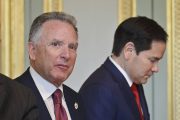
Following Scottish First Minister Nicola Sturgeon’s February 15 announcement of her resignation, the race for both the leadership of the Scottish National Party (SNP) and Scotland as a country began. Although political pundits have singled out Cabinet Secretary Kate Forbes as a potential successor, Forbes’ Presbyterian beliefs and opposition to LGBTQ+ and other liberal ideologies have provoked leftist assaults on her character and ability to lead the nation. Thus, another very likely candidate to succeed Sturgeon has been Scottish Health Minister Humza Yousaf, who likely has links both to the Muslim Brotherhood and other extremist groups.
For eight years, Nicola Sturgeon’s name could not be separated from the SNP. That being said, Sturgeon leaves behind a controversial legacy amid her contentious bid for a second independence referendum in the wake of Brexit. Observers posited that the reasons contributing to Sturgeon’s downfall were leftist measures such as her radical “green” initiatives as well as her notorious Gender Bill that planned to permit those as young as 16 to change their gender without prior surgery or a gender dysphoria diagnosis.
That being said, with Sturgeon’s exit from the political scene, her party seems to be veering even more toward the left under the prospective aegis of Humza Yousaf. The first to declare his plans to enter the leadership contest, Yousaf currently enjoys the backing of key members of the SNP, who assert that the party requires his leadership to usher in a “fresh perspective.”
Although Yousaf seems to be an appealing leader, pledging national reconciliation and unity in all matters, his hitherto links to Muslim extremists and his track record of assisting them using government resources have been alarming to some observers.
Based on a recent report from Focus on Western Islamism (FWI), Yousaf first emerged in the limelight in the late 2000s while being an aide to former SNP leader Alex Salmond and other senior party leaders. At that time, Yousaf was also acting as the director of public affairs at the Scottish Islamic Foundation (SIF), together with his cousin, Osama Saeed.
In 2010, the Quilliam Foundation, a (now-defunct) Muslim-run counter-extremism organization, gathered a list for the British security officials that cautioned the authorities that SIF was an “entry level” Islamist group that was involved in radicalization and extremism within British Islam. After the FWI report, Scottish opposition parties called for an investigation into the SNP’s decision to fund the SIF with over £400,000.
Furthermore, parliamentary questions have disclosed that Yousaf and Saeed, through SIF, arranged meetings between extremists and senior Scottish politicians. For example, 2008 saw Yousaf arranging a meeting with Scotland’s Minister for Europe, External Affairs and Culture. This meeting was attended by three key Islamists: Mohammed Sawalha, Anas Altikriti, and Ismail Patel.
Sawalha had been identified by the BBC as a fugitive Hamas commander, whereas Anas Altikriti had long been a prominent member of the Muslim Brotherhood in both the U.K. and Iraq. Additionally, Ismail Patel was a supporter of Hamas, and had already, at the time of the meeting, harbored a reputation for hardline Islamism, such as his calls for the killing of adulterers and punishment for “free mixing of men and women.”
In 2013, Yousaf, then serving as Scotland’s minister for external affairs and international development, declared a £398,000 grant to Islamic Relief, one of the largest Islamic charities in the world. This charity, which was set up by prominent names from the Egyptian Muslim Brotherhood, has been decried by European and Islamic governments for its links to Hamas and other terrorist groups.
To make matters more complicated, Yousaf’s cousin and SIF colleague, Osama Saeed, a controversial Islamist operative, once ran for a SNP parliamentary role. Notably, Saeed urged for the establishment of an Islamic caliphate in 2005.
That being said, although Yousaf has been a promoter of Islamic ideas, his underlying ideology is not set in stone. During the current SNP leadership race, some of the current talk surrounding Yousaf in British media has been whether his religion conflicted with the SNP’s more progressive agendas in any way. Notably, the Daily Mail reported Yousaf as stating that although “mainstream Islam” appears hostile to “gay marriage,” he would not use his religion as a “basis” for legislating.
In the race for the country’s top leadership, Yousaf’s aforementioned declaration makes it seem that he champions a more left-wing approach than rival candidates such as Forbes, as evidenced by his support of Sturgeon’s positions on same-sex marriage, abortion clinic “buffer zones,” and various “trans” issues.
Yousaf has also slammed radicalism in recent years by lambasting Islamist clerics who lauded Pakistani violent extremists.
Yet, some analysts contend that Yousaf might champion a mix of Islamism and progressivism, pointing to his 2012 announcement of his support for “progressive political Islam” on Twitter. In the same Twitter thread, he lauded the “main Islamic Party” in Tunisia as an example. Hence, it is still unclear if Yousaf would continue his Islamist activism once elected as SNP party leader. Besides, it remains to be seen if Yousaf would promote even more leftist policies than his predecessor Sturgeon.
Sturgeon, who has been Scottish first minister for eight years, had previously faced criticism for her handling of the Isla Bryson case, where a “transgender woman” convicted of two rapes was remanded in a women’s prison based on transgender laws passed by Sturgeon’s government last year.
The Scotsman, Scotland’s national newspaper, reported that opposition leaders lampooned the former first minister’s response to the Bryson scandal as “chaotic and cynical.” Following the scandal, Scottish feminist groups have even demanded the revoking of the transgender legislation.
Sturgeon stoked controversy by alluding to the rapist as male before backtracking as conflicts began within the SNP over the incident. Apart from her mishandling of the Bryson case, analysts have suggested that Sturgeon’s resignation was linked to the announcement of a fraud investigation into the SNP’s finances by Scottish police.
Interestingly, an SNP official characterized the resignation to the Telegraph as being the SNP’s “Jacinda Ardern moment,” alluding to the departure of the former New Zealand prime minister, elaborating that it was “better to leave before the ship sinks and you’re pushed.”




